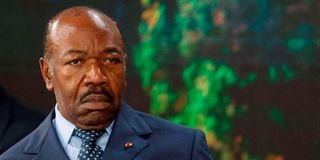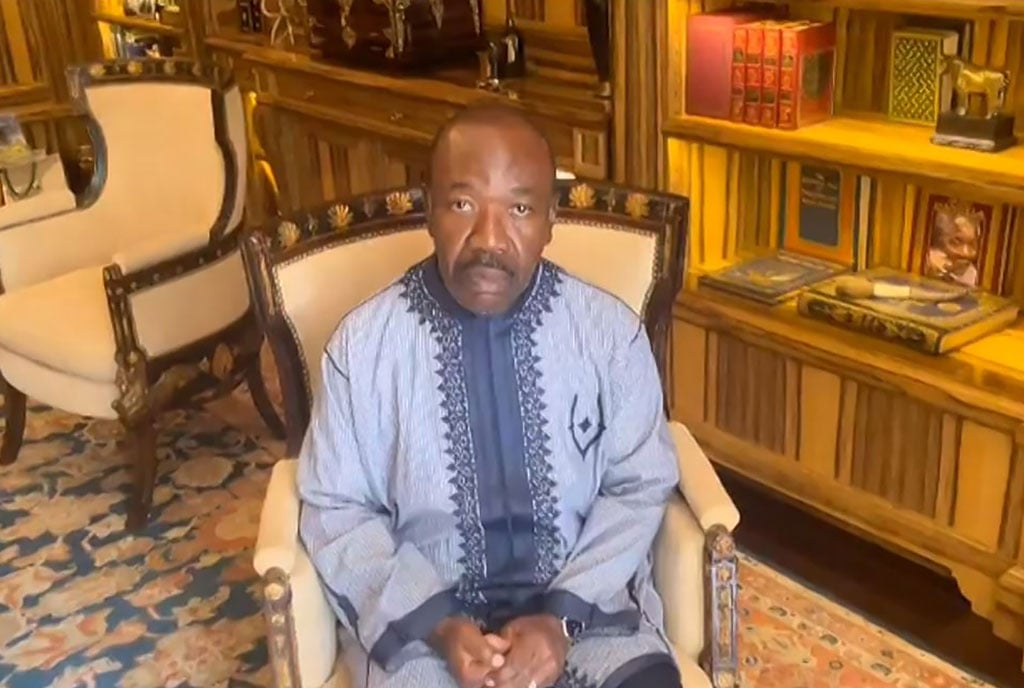The noise Ali Bongo didn't want

Gabon's President Ali Bongo at the Presidential Palace in Libreville on March 2, 2023.
Ali Bongo Ondimba, the former president of Gabon, is under siege. On Wednesday he uncharacteristically called for "some noise" about his ouster. What he got was noise, yes, but not helpful noise.
Since Wednesday, as word spread that he had been removed from power shortly after 'winning' the elections, the streets near his palace have been filled with shirtless people and soldiers singing all night.
They sang victory and liberation songs and carried placards praising the military. For Gabon at least, no Russian flag has yet appeared in the crowd, suggesting that this was largely an internal split. In recent coups in Niger and Mali, Russian flags were waved by crowds chanting in the name of the military and the Wagner group.
Back to the noise: Bongo wanted the world to shout down the military. Instead, they prayed loudly, live on television, after announcing they had ousted him. They asked God to protect the people of Gabon, to guide the army to lead the country on a better path. They prayed for peace to prevail.
Then they closed the borders, forcing airlines to divert flights from Libreville. For example, a scheduled Ethiopian Airlines flight from Addis Ababa to Yaoundé via Libreville was immediately cancelled. It diverted passengers from Libreville to neighbouring Yaoundé. Naturally, the flight was shorter for those originally bound for Cameroon. Meanwhile, Gabonese airspace was cleared by all. No noise from the skies.
"It's better for me to be in Yaoundé, but my problem is my family... I couldn't reach my family because the internet was cut," one of the passengers on the Ethiopian flight - a Gabonese returning from Europe - told Nation.Africa.
At least there was good noise from outside Gabon. The US, which refused to call it a coup, urged the military to "show restraint and respect for human rights" and to address its concerns peacefully through dialogue.But Washington said it was "concerned" by the lack of transparency and reports of irregularities surrounding the election.
Earlier, the African Union said the military takeover was a "flagrant violation of the legal and political instruments" of the continental body.
"The Chairperson of the African Union Commission (Moussa Faki Mahamat) calls on all political, civil and military actors in Gabon to give priority to peaceful political ways and a speedy return to democratic constitutional order in the country," the AU said in a statement. The AU left out the part about the fairness of the elections. France also condemned the military takeover and said it hoped the Gabonese would respect the results of the 26 August vote.
The UN and the UK weighed in on events in the oil-rich Central African country. The Economic and Monetary Community of Central African States (CEMAC) had yet to issue a statement at the time of writing. The saddest reality, or noise, for Bongo is that the coup ended his family's 55-year leadership hegemony over the country.
The ousted leader had been president since 2009, when he succeeded his late father, Omar Bongo Ondimba, who had ruled for almost 42 years.
There had been growing calls for the ousted Bongo to step down since he suffered a stroke in 2018, forcing him out of the public eye for almost a year.
"The military takeover in Gabon will be hard to criticise given the series of votes - you can't call them democratic elections - that kept the Bongo family in power [for] 56 years," tweeted Tibor Nagy, a longtime US diplomat who served as assistant secretary of state for Africa.
As well as placing the ousted president under house arrest, the coup leaders said they had arrested Bongo's son and close adviser Noureddin Bongo Valentin, his chief of staff Ian Ghislain Ngoulou and his deputy, two other presidential advisers and the two top officials of Gabon's ruling Democratic Party (PDG), accusing them of "treason".
The deposed Bongo, 64, later appeared in a video on Wednesday gargling an appeal for help from the international community. Appearing shocked, Bongo called on "friends all over the world" to "make some noise" for the people who arrested him and his family.
In the video, which he said was recorded at his residence, Bongo said his son was in one [unknown] place while his wife was in another.
"I am at the residence and nothing is happening. I don't know what's going on, I'm calling you to make noise," a trembling Bongo said in the video.





